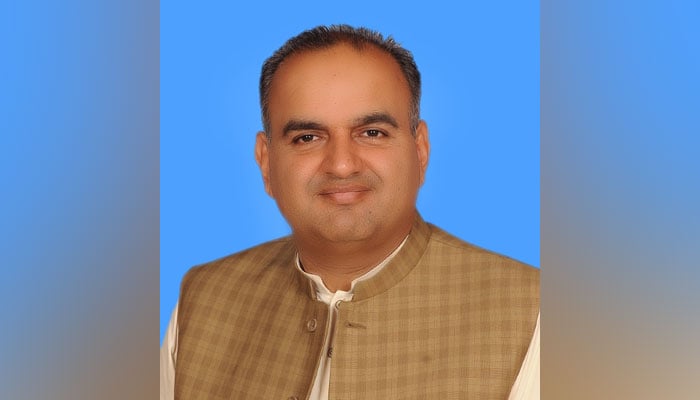MNA introduces Gandhara Corridor Bill to link Pakistan with Buddhist world
However, it may set up sub-offices or representative offices at other places within Pakistan, as it may deem appropriate
ISLAMABAD: MNA Dr. Ramesh Kumar Vankwani has introduced a significant private member bill in parliamentary history, aimed at establishing the Gandhara Corridor to connect Pakistan with the Buddhist world.
“This bill aims to encourage uniformity of approach among all branches of government and stakeholders for transforming Pakistan into the most favoured pilgrimage destination and an international hub of Gandhara tourism,” the proposed bill stated, which was submitted to the secretary, National Assembly Secretariat, under Rule 118 of the Rules of Procedure and Conduct of Business in the National Assembly, 2007.
“It is expedient to establish a high-level statutory body to ensure that due facilitation support at the federal level must be provided to provinces and administrative units of Pakistan for pursuing a common national cause of promoting international pilgrimageand faith tourism through the systematic promotion of the Gandhara region, encompassing Pakistan.”
According to the bill, the corridor shall be headed by the chairperson to be appointed by the prime minister, whereas the head office of the corridor shall be in Islamabad.
However, it may set up sub-offices or representative offices at other places within Pakistan, as it may deem appropriate.
Dr. Ramesh Vankwani, in the statement of objects and reasons for the proposed bill, took the stance that under Article 40 of the Constitution of Pakistan, the state shall foster goodwill and friendly relations among all nations as well as support the common interests of the peoples, including those of Asia.
He also quoted the Quaid-i-Azam as saying, “Our foreign policy is one of friendliness and goodwill towards all the nations of the world.”
“Establishing the Gandhara Corridor would be a game-changer and a highly impressive initiative for connecting Pakistan with the Buddhist world,” he said, emphasising that the systematic arrival of international pilgrims will promote the national economy as well as strengthen diplomatic ties with Asian countries under the Constitution of Pakistan.
According to Dr. Vankwani, the 2,500-year ancient Gandhara civilisation, belonging to the northern part of present-day Pakistan, reflects Buddhism’s glorious past in our region. “Today, over seven percent of the world population (approximately 520 million people) is composed of Buddhists. Several Pakistan-friendly Asian countries, including Japan, Korea, China, Myanmar, Thailand, Cambodia, Vietnam, Sri Lanka, Singapore, Bhutan, Laos, and Mongolia, have large Buddhist populations,” he expressed.
“The Gandhara Corridor may, in the performance of its functions, seek the assistance or facilitation of any office, authority, or agency working under the federal government, a provincial government, a local government, or a representative designated by the provinces and territories.”
In this regard, provinces and territories may appoint a representative or focal person to provide liaison and assist the corridor in the performance of its functions under this act,” the bill stated.
Moreover, the Gandhara Corridor aims to conduct research and analysis, enhance capacity, develop policy and strategies, advise various branches of the government, foreign missions, academia, and professionals, facilitate the private sector, mobilise media, cultivate awareness, responsibility, and help build capacity as individuals. It also aims to establish partnerships with stakeholders and collaborations with national and international organisations for promoting and marketing Gandhara historical sites to attract international pilgrims, including Buddhists, Hindus, and Jains, belonging to various countries in the best interest of Pakistan.
-
 King Charles ‘very Much’ Wants Andrew To Testify At US Congress
King Charles ‘very Much’ Wants Andrew To Testify At US Congress -
 Rosie O’Donnell Secretly Returned To US To Test Safety
Rosie O’Donnell Secretly Returned To US To Test Safety -
 Meghan Markle, Prince Harry Spotted On Date Night On Valentine’s Day
Meghan Markle, Prince Harry Spotted On Date Night On Valentine’s Day -
 King Charles Butler Spills Valentine’s Day Dinner Blunders
King Charles Butler Spills Valentine’s Day Dinner Blunders -
 Brooklyn Beckham Hits Back At Gordon Ramsay With Subtle Move Over Remark On His Personal Life
Brooklyn Beckham Hits Back At Gordon Ramsay With Subtle Move Over Remark On His Personal Life -
 Meghan Markle Showcases Princess Lilibet Face On Valentine’s Day
Meghan Markle Showcases Princess Lilibet Face On Valentine’s Day -
 Harry Styles Opens Up About Isolation After One Direction Split
Harry Styles Opens Up About Isolation After One Direction Split -
 Shamed Andrew Was ‘face To Face’ With Epstein Files, Mocked For Lying
Shamed Andrew Was ‘face To Face’ With Epstein Files, Mocked For Lying -
 Kanye West Projected To Explode Music Charts With 'Bully' After He Apologized Over Antisemitism
Kanye West Projected To Explode Music Charts With 'Bully' After He Apologized Over Antisemitism -
 Leighton Meester Reflects On How Valentine’s Day Feels Like Now
Leighton Meester Reflects On How Valentine’s Day Feels Like Now -
 Sarah Ferguson ‘won’t Let Go Without A Fight’ After Royal Exile
Sarah Ferguson ‘won’t Let Go Without A Fight’ After Royal Exile -
 Adam Sandler Makes Brutal Confession: 'I Do Not Love Comedy First'
Adam Sandler Makes Brutal Confession: 'I Do Not Love Comedy First' -
 'Harry Potter' Star Rupert Grint Shares Where He Stands Politically
'Harry Potter' Star Rupert Grint Shares Where He Stands Politically -
 Drama Outside Nancy Guthrie's Home Unfolds Described As 'circus'
Drama Outside Nancy Guthrie's Home Unfolds Described As 'circus' -
 Marco Rubio Sends Message Of Unity To Europe
Marco Rubio Sends Message Of Unity To Europe -
 Savannah's Interview With Epstein Victim, Who Sued UK's Andrew, Surfaces Amid Guthrie Abduction
Savannah's Interview With Epstein Victim, Who Sued UK's Andrew, Surfaces Amid Guthrie Abduction




